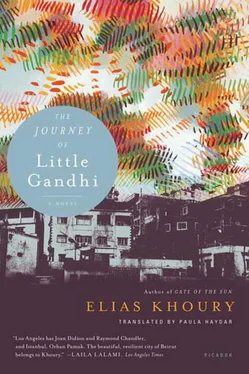“Even those armed men, those sons of bitches, didn’t touch her. I told my cousin, please take her, take her for one day, and then if you don’t want her, send her back. The only thing that can cure her is for a man to sleep with her and make her bleed. But the son of a bitch refused. I told him, you can send her back, no questions asked, I’ll pay. But he was afraid. He, too, was afraid. And what’s wrong with the girl, she’s beautiful. He’s a son of a bitch, he smells, and he refused. He said he didn’t want to get married, does anyone refuse marriage? He said his wife won’t allow it. Does anyone refuse to marry a second wife?”
The girl returned, and Little Gandhi returned from his attempts to find a cure for her, void of all hope. His wife said, “This is our fate, my dear, we have to be content with it. Contentment is a treasure.” And so Gandhi was satisfied with his treasure and stopped searching.
Gandhi told the Reverend Amin the story, but he didn’t understand any of it. He looked at Gandhi with clouded eyes and snored, as though he were asleep. Gandhi felt sorry for the Reverend. He’d pass by him at his house on the second floor of that building, which was painted purple like a piece of hard candy. Those days Gandhi would go to the Reverend and give him bread, and some money. And the Reverend seemed to be unconscious; if it hadn’t been for Alice, he’d have been left to die, paralyzed on the steps of the Church of the Virgin on Makhoul Street.
Gandhi could remember the Reverend in his younger days. That was just after he’d come to Beirut, in the middle of the crisis with the dog. After Mr. Davis’s dog died, Gandhi went back to his original profession. He got the shoe-shine box and sat in front of the American University. He took the Reverend’s advice on his new plan and bought a dog to replace Fox and named it Fox. He tried to persuade Mr. Davis, but Mr. Davis just couldn’t understand. He’d walk all alone on Bliss Street, in front of the university, unable to speak.
John Davis said his mission in Lebanon had failed.
He said he came and became a real Arab, he loved the people, loved Beirut, loved fried fish and cauliflower with tahini sauce, he loved them and became one of them. But it was impossible. The East is barbaric; if not for India and the real Gandhi, the East would’ve remained barbaric.
John Davis couldn’t understand how that man had laughed at him as he knelt trembling over his dead dog.
“It’s a dog, sir, just a dog,” the man said, and then he spit.
It wasn’t enough that he’d killed the dog, the man had to spit on him, because dogs are filthy.
It was then that Davis cut off his relationship with the Reverend Amin. The Reverend tried to lessen the blow for Davis by helping Gandhi raise the dog for the sake of his American friend, and for the sake of their friendship, but the American professor couldn’t take the shock, and couldn’t understand how the Reverend had spoken in defense of the Arabs and rejected what he’d said. Their friendship was famous. The Reverend Amin would speak to him in English, with a New York accent that he didn’t really know, and Davis would respond with his own unpolished Beiruti Arabic. Davis was studying moral philosophy at the American University, and the Reverend Amin was in charge of the Beirut parish of the Episcopal church. Both were Protestants. The Reverend Amin believed that America was the heart of civilization and progress and freedom, and Mr. Davis detested New York, where he’d lived and taught in its universities, and loved the East and spices and Arabs. Mr. Davis’s story is unusual, especially when he tells how he learned Arabic from Mustafa Ghalayini, the barber, before studying it in Shimlan, at the school that was founded solely for teaching Arabic to foreigners. Mr. Davis, who’d lived alone with his wife, with no children, left Beirut seven years before the beginning of the civil war in 1975. And it appears that the murder of his dog was decisive in deciding his future. Mr. Davis told the Reverend Amin that he felt extremely lonely, and that all his work in Lebanon was a complete loss.
“Suddenly I feel like a stranger, I feel that no one, no one in the world cares for me. And my wife, who’s constantly sick, wants to go back to the States. This is my country, but I’m going. All has failed. I’m not upset about the dog, but how could he have spit on him? How?”
The American professor bent over his dog, who was in the throes of death in the middle of the street, and the driver who’d run over him with his car got out of the car and spat. The professor felt that everything had come to an end, and nothing the Reverend Amin tried did any good, including helping Little Gandhi take care of Fox’s replacement, which Gandhi bought, making sure it was of the same breed as the original Fox.
When the professor refused to take the dog and Gandhi wanted to get rid of it, Lillian suggested killing it. And it was the Reverend who went to the drugstore and bought the poison that Gandhi put in the dog’s milk.
Little Gandhi didn’t like the Reverend Amin, for, in spite of his kindness and that of his parishioners, he was haughty. He spoke with a low voice and used a dialect that was a cross between Beiruti colloquial Arabic and classical Arabic, and he was always shaking his head to give the impression he was trying to understand others. But then he’d turn around and do whatever made him feel good. The smell of whiskey was always on his breath, and the stories of his adventures with Lillian Sabbagha were well known, or they’d become well known, after Madame Sabbagha disclosed them during one of her crazy spells. That was when her Russian maid Vitsky Novicova died. She stood in front of the maid’s room with a handkerchief over her mouth and started screaming. Then she cursed the Reverend Amin and divulged all their secrets.
Gandhi became interested in the Reverend Amin because he felt sorry for him. His wife left him and joined their children in the United States, and he suffered a total breakdown. The Reverend started wetting his pants and speaking nonsense. Every morning he’d go to the Church of the Virgin, stand in front of an icon of the Virgin, make the sign of the cross, and bow down so low his forehead touched the ground, then he’d stand like an idiot in front of the Royal Door. He’d raise his hands to the heavens and approach the altar. And Father John would take him aside, set his mind at ease, and remind him he was a minister and it was his duty to watch over his parish. But it appeared that the Reverend Amin had forgotten everything. He forgot about his parish, and that he was a Protestant, and no longer remembered any prayers except for one sentence: “ Doxa patri kai huio kai hagio pneumati nun kai aei kai eis tous aionas ton aionon. Amen.” “Glory to the Father and to the Son and to the Holy Spirit, now and forever and unto ages of ages. Amen.”
Senility, Father John would say, thanking Alice for her kindness. “My child, you are a good woman, may God have mercy on you in your old age.”
The Reverend Amin lost track of everything. He forgot he was married and had children and no longer knew anything but a few prayers in Greek. He forgot the story of his grandmother, Um Tanios, in Sidon, who would yell “O Muhammad, my beloved.” And he forgot how he became a minister in return for a favor the Reverend Salim extended to his father during the war, when he saved him from starvation by appointing him a professor in the School of Art in Sidon. And so his father became a Protestant, but never got over the habit of making the sign of the cross.
The Reverend forgot everything, even Madame Sabbagha, whom he wished would fly. He used to tell her she was incapable of flying, because she was a worthless woman, and that he’d loved her because, he’d discovered, he was no good with women. He forgot everything, and he’d been cast aside, alone, in front of the Church of the Virgin, with no one to care for him, in the middle of the bombs of war that fly and transform the city into a desert of lost faces. When Alice took him to the nursing home in Ashrafiyyeh, he couldn’t speak. He was standing in front of the church, with some militia men around him who were making fun of him. He was like a stray animal, smelling dirty, unshaven, his hands clinging to the church banister so he wouldn’t fall down.
Читать дальше












